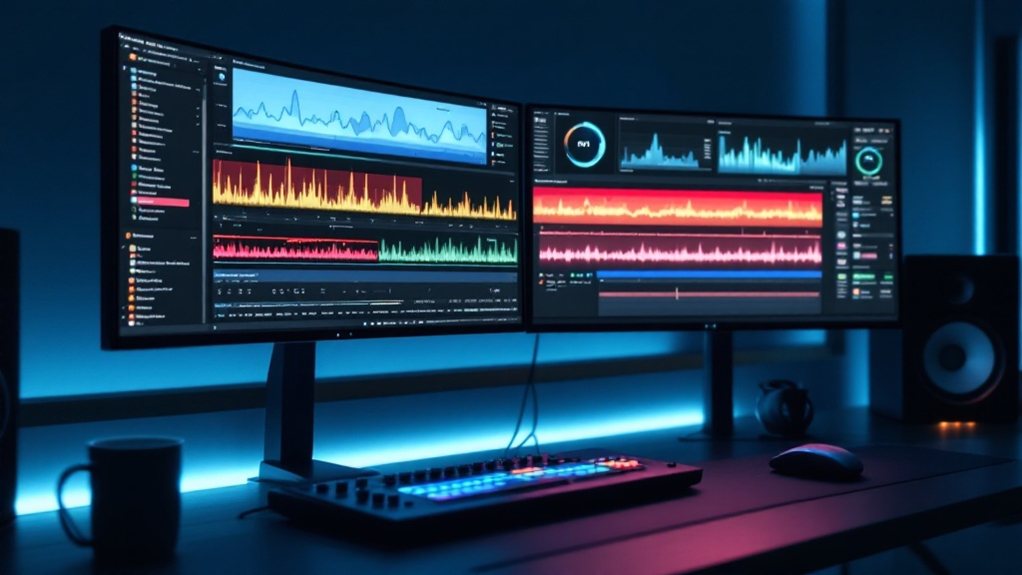Companies are going all-in on AI recruitment tools, with 68% expected to use them by 2025. These systems scan resumes, conduct interviews, and crunch candidate data 24/7 – no coffee breaks needed. AI speeds up hiring while cutting costs, but it’s not all roses. Some firms auto-reject candidates without human input, and bias concerns exist. Yet the robots march on, transforming how businesses find talent. The future of hiring looks increasingly algorithmic.

While companies rush to embrace the latest tech trends, artificial intelligence is rapidly becoming the new gatekeeper of employment opportunities. The numbers don’t lie – by 2025, a whopping 68% of companies will use AI to decide who gets hired and who doesn’t. Big corporations, with their deep pockets, are leading this charge while smaller businesses watch from the sidelines.
Let’s be real: AI is everywhere in hiring now. It’s scanning resumes, conducting interviews, and even analyzing social media profiles. A staggering 82% of companies let algorithms sift through resumes, and nearly a quarter trust AI to handle entire interviews. Yes, you read that right – robots are now conducting job interviews. Welcome to the future, folks. Tools like resume parsers scan applications to match qualifications with job descriptions in seconds.
The benefits are hard to ignore. AI slashes hiring time, cuts costs, and supposedly finds better candidates. It’s like having a tireless HR assistant that never needs coffee breaks or vacation time. Companies love how it automates the boring stuff, freeing up their human recruiters to do more strategic work. This shift allows HR professionals to focus on complex tasks that require human judgment and insight.
AI transforms hiring into a 24/7 powerhouse, handling tedious tasks while human recruiters focus on what really matters.
And candidates? They get faster responses and more updates about their applications. At least that’s what the machines tell us. An alarming 21% of companies automatically reject candidates without any human review of their applications.
But it’s not all sunshine and algorithms. Almost every company admits AI can introduce bias in hiring decisions. Garbage in, garbage out – if the data fed into these systems isn’t perfect, the results won’t be either. Privacy concerns are real too. These systems are scraping personal information like there’s no tomorrow, raising eyebrows about data protection.
The future of recruitment is decidedly digital. Companies are rolling out AI-powered everything: from tests that assess skills to chatbots that handle candidate communication. Some tools even help write job descriptions and identify internal talent.
It’s a brave new world where algorithms influence who gets hired and who doesn’t. And while the machines aren’t taking over completely – human judgment still matters – they’re definitely changing the game. Ready or not, AI recruitment is here to stay.
Frequently Asked Questions
Can AI Accurately Assess Soft Skills and Emotional Intelligence During Recruitment?
AI’s assessment of soft skills is a mixed bag.
While it excels at analyzing communication patterns and behavioral consistency through NLP and video analysis, it struggles with cultural nuances and genuine emotional intelligence.
The tech can spot basic interpersonal cues but miss subtle human elements.
Sure, it’s faster than traditional methods and reduces bias, but it’s not foolproof.
Human oversight remains essential.
What Happens if AI Hiring Systems Encounter Technical Glitches During Interviews?
Technical glitches in AI hiring systems can wreak havoc.
Candidate data gets exposed, interviews crash mid-session, and stress levels skyrocket. Sometimes the AI completely blanks out – leaving everyone hanging. It’s a mess.
These failures not only damage company reputations but can send top candidates running.
Integration problems with HR systems make things worse, and delayed hiring decisions mean losing talent to competitors.
How Do Companies Ensure AI Recruitment Tools Don’t Discriminate Against Candidates?
Companies tackle discrimination in recruitment tools through rigorous testing and diverse training datasets.
Regular bias audits catch potential issues. Neuroscience-based games assess skills fairly. Human oversight remains essential – actual people review AI decisions.
Some places, like NYC, legally require annual bias checks. Diverse development teams help spot problems early.
Still, no system’s perfect – constant monitoring is key.
Are AI Hiring Decisions Legally Binding Without Human Intervention?
AI hiring decisions typically aren’t legally binding without human oversight.
Most companies use AI as a tool, not the final decision-maker. Courts and regulations generally require human review of automated hiring processes.
Some jurisdictions explicitly mandate human involvement. Plus, given recent legal precedents, companies usually keep humans in the loop to avoid potential discrimination lawsuits.
It’s just smarter that way.
Can Candidates Request to Opt-Out of Ai-Based Recruitment Processes?
Candidates can request to opt out of AI recruitment processes at many companies, but it’s not guaranteed.
Some organizations offer clear opt-out choices right on job postings. Others? Not so much.
Opting out might mean less visibility in candidate pools – especially at tech-heavy companies. The trade-off is real: skip the algorithms, potentially miss opportunities.
Direct applications and networking become vital alternatives.









